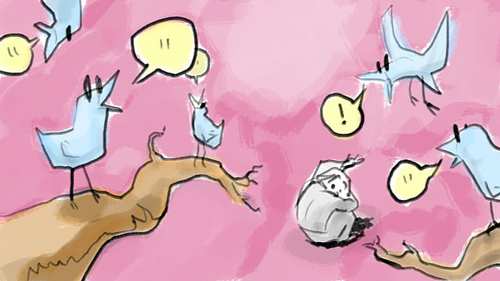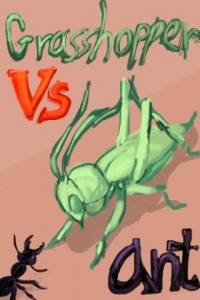This first ran July 15, 2013. I was just learning to stay out of Twitter fights. I’ve needed to learn this several times since but I think I’ve about got it now. My reasons have changed though: not only the impossibility of a logical argument but also the improbability that everyone will understand the subtlety of my double-edged humor and will instead think I’m just an incomprehensible show-off jerk.
Last week one day my Twitter feed lit up like a rocket launch. The people I follow on Twitter are mostly science writers and they generally confine their passions to the likes of supernovas, dinosaurs, fracking, insect sex, and disfunctionalMRI’s. But last Thursday @page88, a media/culture writer with a Harvard PhD in literature, wrote for Yahoo News a short, breezy post about not understanding science and preferring literature, explaining that for her, this added up to a reason for being a creationist. That is, all explanations of the universe are just stories, so you’re free to choose the ones you like best. She tweeted a link to her Yahoo News post. The science writers got irate. She defended herself. TWITTERFIGHT!
It was fairly seemly – the first response, by @harrisj, was “Umm. Okay” — but @page88 was seriously outnumbered. When I first saw it, @page88 had written that she reads Darwin as literature, but her literary training “keeps me from seeing it as truth.” I personally don’t see Darwin as truth either; probably even Darwin didn’t, scientists don’t like the word “truth.” But the extent to which Darwin is true has nothing whatever to do with literary training. I got a little irate myself. “Will someone pls storify this?” I tweeted, “I can’t f-ing believe it.”
Storifying is a way of lining up everyone’s tweets into an uninterrupted conversation so you can see the argument. This particular argument, as I understand it, reminded me of the argument over the Sokal Affair. A scientist named Alan Sokal wrote a fake paper about the cultural relativeness of science for a humanities journal which published it in all seriousness, and afterward the shit hit the fan for years, scientists vs. humanists, furious at each other. I never quite followed those arguments so I was interested in this one, and a Twitter argument with responses with a limited number of characters is just about the depth I can handle. A generous arguer, @albertocairo, posted a Storify that pretty much limited itself to the argument between him, @page88 and another science writer, @carlzimmer.
The words “positivism,” “deconstructionist,” and “Foucaultian” were used. And though @page88 was handling the whole thing with cool and aplomb, she didn’t seem to be making a case and I wanted to see her side. So I clicked from the Storify over to her Twitter page and found more of her arguments plus a wholly different set of arguers, including @TomLevenson (anti) and @rtraister (not exactly pro, but sympathetic).
And now you know where this is going: I clicked from arguer to arguer, Twitter page to Twitter page, and on each page found different parts of the argument and even more arguers on which to click, leading to even more parts of the argument. Finally @paldhous wrote, “Anyone else wish @harrisj’s first tweet on this could have been the last word?” I retweeted the daylights out of that.
So you can’t get a coherent argument on Twitter. And the problem isn’t the limit on characters — @carlzimmer even posted a Twitlonger – but the nonlinear, illogical structure of Twitter. It branches and branches again; people dart in from all directions, tweet at somebody or other, and dart out again. Trying to follow an argument on Twitter is like trying to see the rules in a night full of fireflies. Twitter is just one more way humans have found to talk past each other — not communicate, not converse, just emit random little flashes.
Happily, Twitter’s attention span is also that of a firefly’s and my Twitter feed has returned to its staid self, with a couple blog posts lighting up off the argument then dying out. I still don’t understand the humanists’ argument. And as for a reasonable point-counterpoint on Twitter, what I say is, the hell with it.
__________
Photos: petesimon


Arguments on Twitter are hard to follow I agree, even while you’re engaged in one. I don’t think that makes them less worthwhile though. I don’t think we should not do it.
Discussions, debates, arguments all can build off of each other in a crowd. And like blog commenting, sometimes it’s not about changing the mind of the person you’re arguing with, it’s clarifying a position for the silent watchers. I’m grateful for Levenson and Zimmer’s succinct tweets saying what I might struggle to articulate myself in another context at another time.
[And on another note, as a science illustrator-blogger, I absolutely love the illustrations you used in this post. And that you gave linked credit. Cool beans, Ann.]
We’re not disagreeing too much, Glendon. I was grateful for Levenson and Zimmer too. And as a (mostly) silent watcher, I was surprised at how unclear @page88 was, that is, her position was quite clear but her reasons for that position never made it out of her own mind. I think we disagree in the amount of patience we have for following a crowd argument. We definitely agree in appreciating artists, how their art resonates with and gives the words extra meaning.
People should use these exchanges to try and understand each other, not just try to make or defend your point. Then we might be able to have a real conversation.
As a reporter, I’m uncomfortable with the spectacle of a mass of science writers trying to argue someone into adopting evolution as part of their personal identity. It’s a free country, everyone can argue about whatever they like, but that’s not how I see my job.
Let’s see if I understand you, Ken and Dan. You’re arguing for civility? Really?
The only time I ever got involved in a Twitter argument it was when someone was attacking something I’d written…but refused to engage with me directly. (Like when I asked what he didn’t like about it.) It put me off the whole medium.
I thought the whole thing was pretty civil, as far as Zimmer, Levenson and Heffernan’s tweets were concerned.
And that’s another problem. Civil to incivil: where’s the line?
Ken, many of Carl Zimmer’s tweets were in fact asking Virginia Heffernan to clarify to understand.
I suspect the original tweet was a commentary on postmodernism, rather than an assertion of verifiable truth, which postmodernism never seems to be much concerned about. I think she’s perfectly aware that Creationism as a set of propositions about the world is demonstrably false, even though it may work as a mythological expression of one’s faith in an all-powerful God. Much or most of the Bible is powerful, poetic mythology that conveys truth about human life in a non-literal way, though many misguided people (Creationists) want to uphold it all as literal, factual truth. On the level of myth, or as postmodern narrative, the creation story is as good as any story–because for postmodernism all stories are equally contingent and provisional. There is no ultimate truth and no overarching way to weigh the truth of one cultural narrative against another. I suspect she was saying “I’m going to show you the completely relativistic nature of postmodernism,” not really asserting that Creationism is a verifiably sound alternative to the Big Bang. Or she may have been hinting that science itself is governed by narratives about causality and the material world and objective observation that work exceedingly well in a practical realm–they get repeatable results–but to see the entirety of human experience through that kind of lens might be as limiting and blinding as thinking Creationism is factual. Or, like so many on Twitter, she could have just been bored enough to stir the pot to see what would happen, eh?
I suspect she was doing all the above, David. Thank you for the clear explanation — I mean that, I’ve wanted one.
Thank you for mentioning me in the post. I am not a “science writer”, though, but a professor of information design and visualization. My take on this whole affair is here (sorry for the semi-spam):
http://www.thefunctionalart.com/2013/07/some-journalists-and-designers-dont.html
May I suggest a correction? It’s “Sokal”, not “Sokol”.
Take care,
Alberto
I wonder what Virginia Heffernan might think of all this now. But do I really need to ask her? No, because in 2016 she published “Magic and Loss: The Internet as Art” (Simon & Schuster). Within a handful of pages, she writes about how twitter can suddenly turn “malarial and boggy.” She adds, “The me-me-me clamor of tweeters brings to mind Emily Dickinson’s lines about the disgrace of fame: ‘How public–like a Frog–/To tell one’s name–the livelong June–/To an admiring Bog!'”
A few pages deeper in, she calls twitter “suffocating,” and says, “all our thoughts live in stacked capsules, crunched up to stay small, as in some dystopic hive of the future.”
So poetic, so astute. But I don’t go to twitter for arguments, I go for the pictures people take of poems from books that they hold in their hands. Like opening up a big ledger of random, flipping the pages until I see something like a poem, and I stop. I stop every time, readers of comments at LWON.